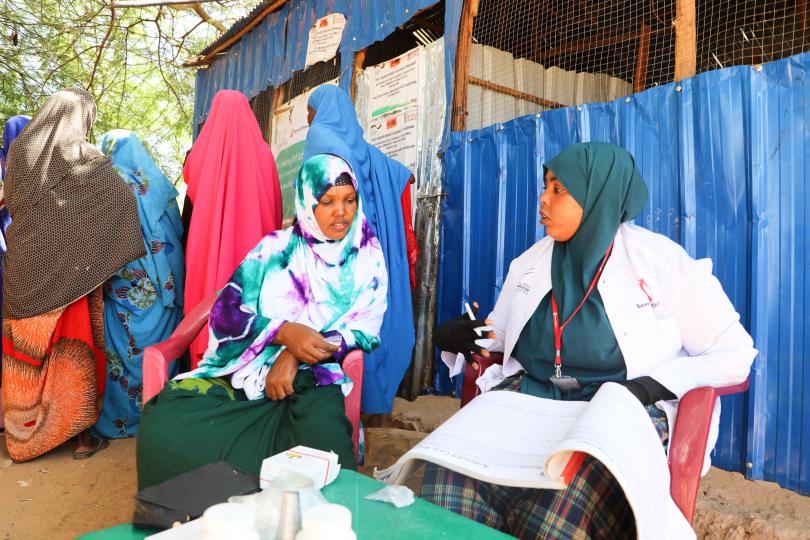The Impact of Mobile Health Clinics: Hodan’s Journey

Story summary
Hodan*, 27 years old, is a mother of four children and pregnant with her fifth. She has been residing in a camp for internally displaced persons (IDP) in the Liben Zone of the Somali region for the past eight years. Previously, Hodan and her family lived in Negele. However, when conflict erupted in the area, they fled to the Somali region.
The IDP community have been receiving essential healthcare services from the mobile health clinic like vaccination, basic medical examinations, medications, and follow-up care. Additionally, pregnant mothers like Hodan receive nutrition support, while children who are at risk of being underweight are provided with specialized care and attention. The mobile health clinic is established by Save the Children with the funding support from the Italian Agency for Development Cooperation (AICS).
Hodan’s story in her own words (Quotes)
“My name is Hodan I have four children; I am now pregnant with the fith one.
“I previously resided in Negele but due conflict, my family and I relocated to this camp.”
“Our income depends on working as daily laborers. My husband and I go out every day into town to do whatever work is available. My husband works as a daily laborer in construction sites while I wash clothes for residents. Before becoming displacement, my husband was a farmer, and we had our own farm.”
“Life as a displaced person is challenging, and we need assistance to rebuild our lives. Since returning to our previous location isn't feasible, I want to establish a stable life here. If I receive any support, I hope to start a small business, like a restaurant, to secure a sustainable income.”
"I am here at the mobile health clinic today for a follow-up on my pregnancy. I am seven months pregnant now, and the team has been very supportive."
“I gave birth to all four of my children at home. However, this time, I want to give birth at the hospital because of the education and follow-up provided by the mobile health team. They visit our camp every week, ensuring we have access to basic health services without having to travel far. We receive vaccinations and free medication through their support."

Hodan during her follow up with a health worker at the mobile health clinic.
Background / Project information
Protecting livelihoods assets, promoting positive health practices, and reducing malnutrition in drought-affected areas of the Somali region (Ethiopia) is a project that aims to save lives, protect livelihoods assets, and reduce malnutrition. It targets the most vulnerable host and IDP households affected by prolonged droughts in the region. Integrated FSL, health and nutrition programming linked to relevant services maximizes impact on vulnerable people in need. The project’s targeted areas are overlapped purposely to ensure access to multi-sectoral services and to multiply the impact of the project. Nutrition is the entry point for food security and livelihoods (FSL) interventions, targeting pregnant and lactating women (PLW) and children under five as well as women affected by acute malnutrition. The multi-purpose cash transfers cover vulnerable household’s basic needs and prevent them from resorting to negative coping strategies, notably affecting the nutritional status of children and PLW. In addition to the monthly transfer of multi-purpose cash and income generation activities (IGA) assistance, Save the Children provides its project participants with nutrition support, consisting of case management, referral system, infant and young children feeding (IYCF), social behavioral change communication (SBCC) on issues such as IYCF practices, health seeking, and nutrition and hygiene and sanitation promotion sessions for PLW, mothers and caretakers. The health response at community and facility level compliments FSL and nutrition response by availing referral systems. Caretakers with identified malnutrition cases but unable to cover transportation service costs to service points use service vouchers for their work. The community and facility level health services helps prevent communicable diseases that deteriorate nutritional statuses of PLW and children, in addition to protecting families from additional health service costs.